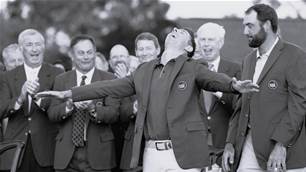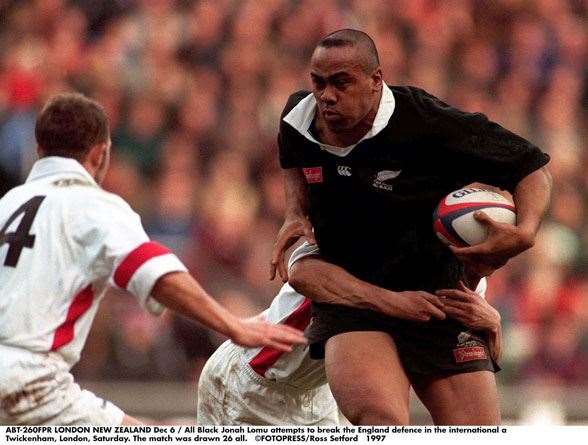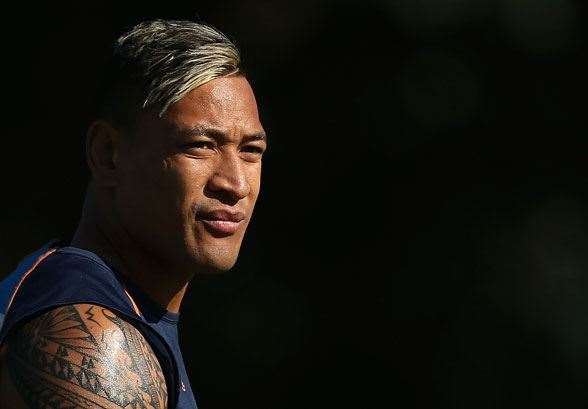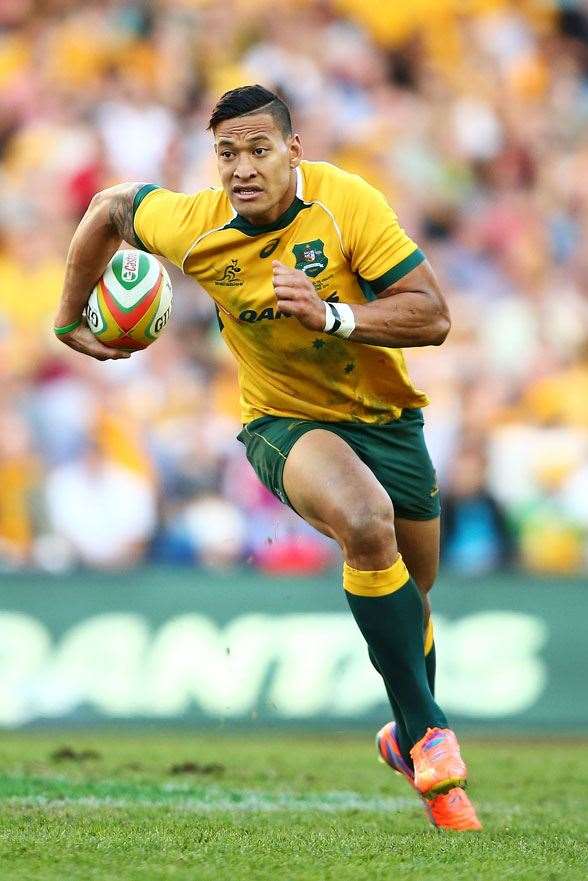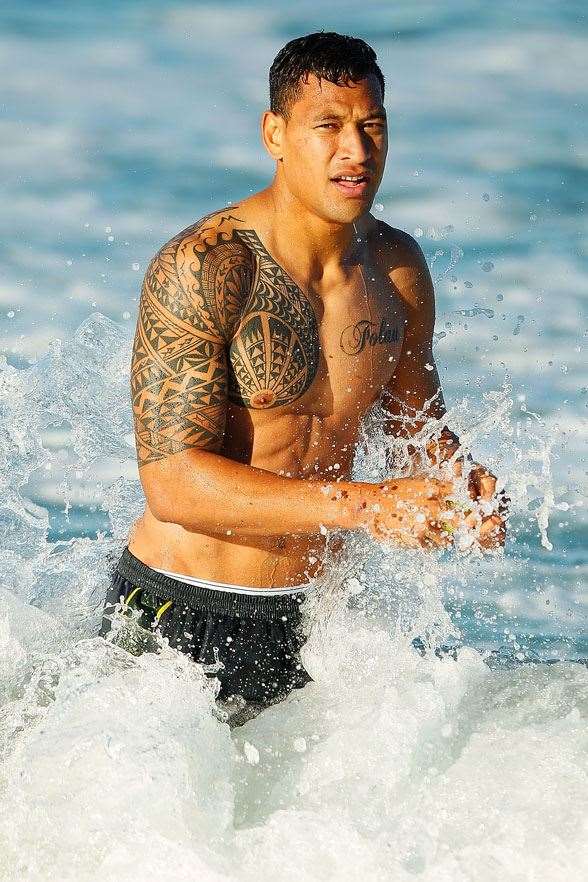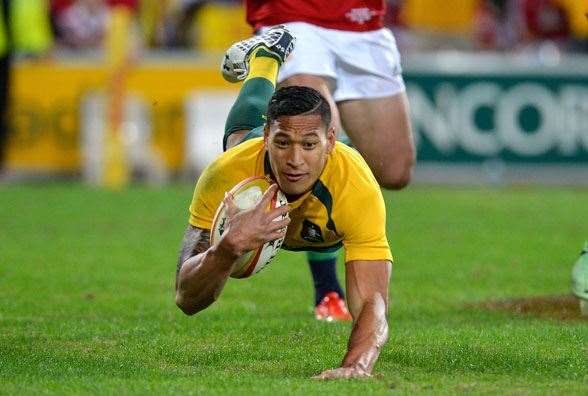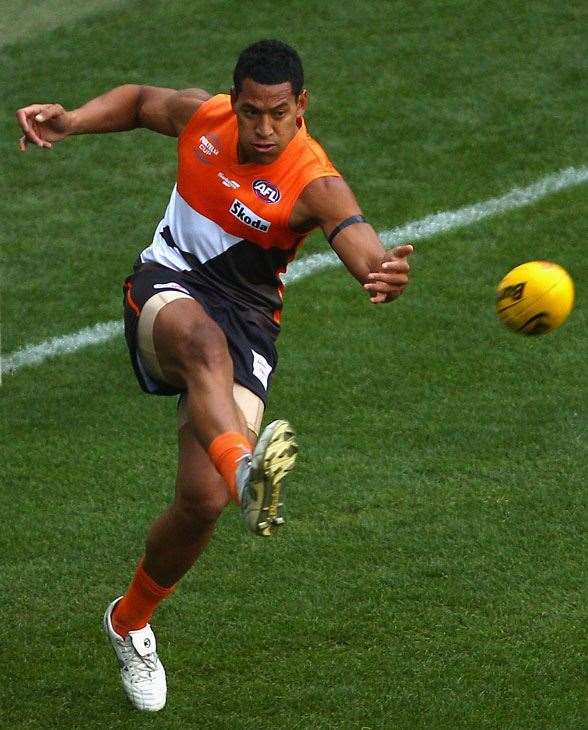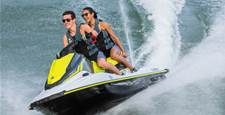There's been no bigger star across Australia's footies than Izzy.
WHEN JONAH LOMU WAS THUNDERING about South Africa at the 1995 Rugby World Cup, strafing defenders like a road train through wheat, there’d never been anything like him. Nobody – not even All Blacks great John Kirwan, first of the Really Big Wingers – had been as athletic, fast, muscular nor massive. Jonah was an outlier event, a phenomenon, a genuine freak. No one had ever seen anything like him.
Today, though, Lomu clones romp across both codes of rugby. The great Polynesian diaspora has given us surnames chock-full of “A”s, “U”s and apostrophes, limbs swathed in tribal tattoos, and blood-thirsty legions of bug-eyed, God-bothering belters. Today, Jonah would be almost normal.
(Well, not normal. I mean, he’d go okay, wouldn’t he, the big man, given his speed and feet and thunderous titanium thighs. But if you were watching him trot out for the All Blacks, slightly swaggering, quadriceps gleaming like the muscles of a golden ox, you wouldn’t be thinking, “Dear God, look at him. How do you stop that?”)
Israel Folau isn’t a freak, not today. Jonah was the last one. Folau, Jarryd Hayne, Greg Inglis, Sonny Bill Williams, Quade Cooper, Kurtley Beale – all have preternatural skill-sets, can do “freakish” things you can scarcely believe. But Lomu shocked the world. Yet like SBW, Hayne Plane-Train, and go back to Andrew Johns and Big Mal Meninga, Folau is definitely one of Them. A Dominator. A player for whom the big end of town will create war chests to court and to keep. Man like that can just about write his own rules – and pay cheques.
Consider others in the rule-breaking, code-hopping pantheon. There’s the Ubermensch, Sonny Bill, carrying the ball in one giant mitt, waving it about like a fruiterer might a cos lettuce. Folau can do that, at greater speed. Remember Jason Robinson, the elusive, feisty, pinball Pom? Great player, Robbo – screamed down the wing like a fast little horse. Israel is a bigger horse with a bigger step, better moves.
And now that he’s had a couple of seasons in the test tube of the Great AFL Experiment, he’s back with a drop-punt and lean muscle. And he’s feeling the love, expressing himself on the rectangular arena and tearing about in the No.15 for Australia. And he’s blitzing ’em. Dominating. On the ground, in the air. Folau owns the air. Owns it.
Yet he wasn’t that flash at Australian rules. His time in the AFL ... well, you saw it. Bits of it, anyway. He was three, maybe four full seasons from being a half-decent, “normal” player, in and out of the Big Show; a full-forward for Dandenong, say, or the Casey Scorpions. But Adam Goodes our Izzy was not. He wasn’t even Mike Pyke. And he knew it.
But as a rugby player … well.
Yes, a fair list of men have played both rugby codes for their country. Mick O’Connor, Ray Price, John Schuster, Andy Farrell. Granite-hard crazy man Brad Thorn won sheep stations in two codes with two countries. Mark Gasnier tippy-toed about for the Dragons in Sydney and for Stade Francais in the 16th arrondissement of Paris. We’ve had Wendell, Lote and Rat Rogers. Berrick Barnes, Joe Tomane. Karmichael Hunt, of course. Benji Marshall had a crack, but at 29, didn’t have time to crack it. Not in the Kiwi rugby gene pool, anyway.
Point is, it can be done. But to so dominate both codes of rugby? And to do it from the wing in league and fullback in union, having just reached the grand old age of 25? Well, Jonah might be Last of the Freaks, but we’ve never seen anything like Israel, either.
THE RISE OF ISRAEL
In April of 1989, Eni and Amelia Folau christened their third son of five (there’s also a daughter) “Israel”, which means “With God”. It’s an uncommon name for a Pacific Islander, though apt for a religious family. Like many Churchies, they don’t have faith. They have know. Folau came up in Minto, just off the Campbelltown Road, a satellite Struggle Town some 50 kilometres and several socio-economic levels south-west of Sydney’s CBD. “It was kind of a rough place for a young kid,” according to Folau. But away from the drink, drugs and other dumb shit teenage kids get up to, Folau had a trinity: family, church, footy.
At Westfield Sports High, he played rugby league with school-mates Jarryd Hayne and Krisnan Inu. Hayne was the superstar, “the freak” according to Folau. The family moved to Logan, south of Brisbane. Nicer than Minto, but not exactly Toorak. Folau went to Marsden High, another footy school. Cam Smith went there. Chris Sandow and Antonio Winterstein were team-mates.
But our man was the star. Aged 14 he was 95kg, had the body of a man. And he could move. Played for Queensland’s Under 19s aged 16. Storm signed him to Melbourne, still a couple years to go at school.
With his parents’ blessing – “Go, son. Take every opportunity that comes your way and make the most of it” – he debuted for the Storm in first grade aged 17. Played 27 games that year, scored 21 tries. Won the grand final. Rookie of the Year. Played for Australia, this boy. Storm’s recruitment guy, Peter O’Sullivan, told anyone who’d listen: “He hasn’t set the world on fire. But he’s holding a lit match.”
There followed Origin. A premiership with Brisbane. Money. Everything. All before he was even 21. And then ... The Offer. Australian rules football came a-calling. The new chums of Greater Western Sydney needed a marquee man to represent the heartland. Money? Lotto numbers, son. Massive money.
But he was massively out of water.
They ran him hard. Flogged him. Fed him steamed chicken and greens. Soon enough he weighed what he did aged 14. He enjoyed the sleeveless tops – “Good if you have guns to show off!” But he didn’t know what he was doing. He’d be waiting there in the forward line, some thin, fit kid tugging his jumper, and trying to anticipate how the ball was going to come to him from so far away. And what the hell was he going to do when it did? Making it harder, the Giants kept getting flogged.
“It wasn’t an environment for a player to enjoy and learn an entirely new game,” Folau told The Daily Telegraph. “I used to wake up trying to find an excuse to not go to training; that’s how much I didn’t like it. I was trying to hide it, but in the end I had to do what was right for myself.”
He spoke to Kevin Sheedy. Spoke to Ricky Stuart. This journo was reticent to speak to Folau given a piece in these very pages had postulated that Folau’s stint in the AFL would be “the sporting equivalent of Troy Cassar-Daley playing third tuba in the Sydney Philharmonic. It won’t be pretty, but it’ll get a few in for a look.”
I asked a journo who knows Folau whether he’d be dark on it. “Nah, probably not,” reckons the journo. “He cops stuff like that pretty well. He knew he was bad at AFL. What he did feel burned by was people bagging him, saying he was money-hungry for going to AFL, for not going to Parramatta. He actually got fuck-all from the ’Tahs to start with.”
Folau’s deal with Parramatta was lucrative, but heavily back-ended. Not much at first – heaps later. When NRL salary cap auditor Ian Schubert wouldn’t allow it over the line, demanding the Eels table an offer commensurate with Folau’s worth (reportedly $350,000 per season), Waratahs coach Michael Cheika – an acquaintance of Folau’s manager, Isaac Moses – made his play.
Says the journo: “At the Waratahs, they said, ‘Here’s the pay cheque. It’s not much at first, but every time you play for the Wallabies, there’s another ten grand. So if you play 15 Tests, there’s some fair extra coin. And if you’ve done that, mate, then we’ll talk again.’ The ARU tipped in a bit as well but, again, there were no guarantees. He’d have to back himself. And, Izzy, he’s a bloke who’d have gone, ‘Yep, I’ll back myself.’ He absolutely knows how good he is. He’s not a shy bloke along for the ride.”
GOLD
While Folau admits he was happy with the powers assigned to “Israel Folau” when playing himself on the Xbox game NRL Rugby League, when he’s at friend and mentor Jonah Lomu’s place, there’s usually just one choice – defend. Picture the scene: Israel and Jonah, two giant men, on the couch, jockeying Xbox controls in their Shrek-sized mitts. On the plasma big screen, they’re playing Jonah Lomu Rugby. Jonah’s the All Blacks, and playing himself. Israel is the Wallabies, France, whoever. So Folau is playing Jonah Lomu Rugby on Jonah Lomu’s couch against Jonah Lomu playing Jonah Lomu. In journo-speak, that is solid, rolled gold. Better yet, Jonah’s flogging him.
The camaraderie between Folau and Lomu, the ease of their mateship, is similar to the Tongan connection that Folau’s found at the Waratahs. The club-within-a-club at the ’Tahs is called “Team Tonga”: Folau, Sekope Kepu, Tatafu Polota-Nau, Wycliff Palu, giant man-child Will Skelton, a few others. Watch them train at Kippax Park in the shadows of the Sydney Cricket Ground. Giant men with hard muscle doing super-physical things at speed. You wouldn’t get in between them and a tackle bag. Tongans don’t tackle, they hit.
Away from the footy there’s in-jokes, dialect, “Tonglish”. There’s obvious brotherhood among a grip of men who feel just a little removed from “Australian”, “white” culture. They share faith, footy and food. It’s a huge reason Folau stayed in rugby. “He instantly felt comfortable around those blokes,” says one insider. “He found a family.”
Watch the boys of Team Tonga, giggling like kids, eyes watering at some silly quip. You have to laugh with them, though you don’t know what’s funny. Watch Folau after scoring a try, how happy he looks. That smile, those eyes. It’s gleeful, joyous, child-like, almost. He’s having the most fun it’s possible to have.
Though he is still “humble” in that Churchie, Polynesian way, he is no longer the shy, mumbling kid who took several months to tell the people at the Melbourne Storm they’d been spelling his name wrong in the match-day program. Israel’s a man.
Some other stuff: he drives about in a sponsor’s European car; he’s generous with his money among his family (when he was 20 and on half-a-mill with the Broncos, he gave everything to Mum and Dad); each week there’s church, family and Mum’s fried chicken; he has a gold tooth, another “Tongan thing” that his cousins have, a 45-minute procedure in which dental types grind out the tooth and pour molten gold into it; he has tattoos of his name, rosary beads and a Tongan design about his family and village.
And here he is, on a rectangular field, showing off his skills, embraced by Team Tonga, feeling fit and happy and good, and enjoying a totally different dynamic to the lost boy of Australian rules. After the machinations of Cheika, Sheedy, Schubert, Moses, Team Tonga, Mungo and money, it’s all been a perfect storm for Australian Rugby. The man is a goldmine.
Indeed by some estimates, Folau earned the ARU something like $4 million in publicity in 2013 alone, paying for himself several times over – even on his heavily upgraded salary. Off the field he’s like a brand, a Lexus advertisement, all smooth lines and class. He’s not ever going to wee in his gob or otherwise disgrace himself. “Rugby” makes news in America when Carney, Hopoate and company disgrace themselves. Folau made an e-zine Stateside for playing three codes. The man is everything these Mungo Muppets are not: inoffensive, sober, clean.
And he’s a sponsor’s dream, according to one PR type, who says Folau “is so intensely loyal to people that he’ll never shy out of obligations. He’s an ‘ambassador’ for ANZ; when there’s a game at ANZ Stadium of any significance, they’ll give Izzy a call. And he’ll drive across Sydney to pose for photos with corporates.” Remember the Major League Baseball this year? And that photo at the SCG? There was Sonny Bill Williams, Adam Goodes, Alessandro Del Piero, and a couple of Major League Baseball guys. But no rugby player. It was meant to be Folau. The photo was about “the best of the best”. The ’Tahs offered captain Dave Dennis. But PR types wanted Israel or no one. They got no one.
Says one journo: “His management said he had a previous sponsor’s engagement. But they’d been organising this photo for months. It’s not fact, but you could surmise that he was being loyal to ANZ. As an ambassador he said “no” to the SCG Trust. That would take balls. It was a big opportunity to be recognised as one of Australia’s biggest athletes. And it was a huge miss for rugby union. But it appears Israel stayed loyal to his partner.”
Sounds like he’s pretty aware of his brand, his image, all that? “He knows what he’s worth. He knows exactly how important branding is. He’s an extremely canny man.”
SUPERSTAR
Israel Folau’s favourite bit of the bible is Proverbs Chapter 3:5-6, which instructs one to: “Trust in the Lord with all your heart, and do not lean on your own understanding. In all your ways acknowledge him, and he will make straight your paths.”
It could be describing his running lines. Inside Sport is at Waratahs and Highlanders at Allianz Stadium on a fine Sunday afternoon in July. It’s the 42nd minute and there’s a scrum ten metres out from the Otago line. Nick Phipps dishes to Kurtley Beale, who turns it inside to Folau, flying. From this point there’s an inevitability about it. He steps, he barges, three Otago defenders get hold of him, but he just piles through them, a big kid over small, arm out, plant the pill, over. And he gets up laughing his head off.
Folau’s first game of rugby since three matches in high school was a trial against the Melbourne Rebels in Hobart. He scored a fine try and got ten minutes in the sin bin, for what he’s still not sure. “I thought it was a warning,” he told Rugby World. “I walked back to the wing and one of the boys said: ‘You’ve got to get off. It’s ten minutes in the bin.’ I still have no idea what I did wrong. I think it was something at a ruck.”
He made the Wallabies that year, but didn’t look fantastic. His debut against the mighty British and Irish Lions six months later in Brisbane was memorable for his two tries and for giant Welsh wingman George North, while in possession, putting Folau over his shoulder and carrying the ball and Folau up field. His Rugby Championship also wasn’t scintillating – until they played Argentina in Rosario. It’s when Folau worked it out – and Australian rugby worked out how best to use him.
Previously he’d been on a wing and a prayer, like his AFL days, almost an observer, waiting for the ball to come to him. And when it did it was like, here you go, Israel, you’re good, make something happen. And not a lot did. But in that game against the Argies, he started running off Quade Cooper. And he opened them up, scored a hat-trick, flogged the Pumas 54-17. And he was away.
It was sort of like running around the ruck and hitting balls off Cooper Cronk and Cameron Smith at the Melbourne Storm. Little popped passes, short balls, Folau with the mandate to hit the ball hard. He did it off Beale against the Highlanders. He did it off Will Skelton in the third Test against France. Hit it, Izzy. He’s found that potency comes from working with others. It’s not just about beating ten blokes with a series of monster steps. He’s scoring tries by running hard, tight, perfect lines. And he’s backing up runners. And he’s shredding ’em. And we may have an All Black to thank for it.
We’ve mentioned Jonah Lomu in this piece, you may have caught that. And though the big man was indeed memorable for flattening would-be tacklers and just charging over them and all that great, fun stuff, a lot of his tries actually came in support. How many times did he trail after Josh Kronfeld, and vice-versa? How many times did he just keep pace with Christian Cullen and take the last pass? Answer: a lot. As least as many of his tries came through support play as road training. As destructive as Lomu was, he was also smart about the men he followed. And it isn’t a stretch to see Lomu telling him these things over coffee, dinner or his latest massacre on the Xbox.
Either way, Folau today is the best support player in the game. He’s become a superstar sort’ve without trying to be one. Almost as this magazine hits the news stands, the Wallabies will be facing the All Blacks’ haka. And even given the team nature of rugby, this Tongan torpedo with the look of a bulked-up Usain Bolt, is probably, arguably, all that stands between the All Blacks and the giant, 33-tinnie silver cup named after Lord Bledisloe.
Jonah might’ve been an outlier event. But Israel’s out there with him.
Related Articles
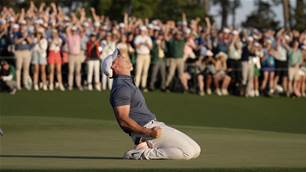
Feature Story: Moving the Needle
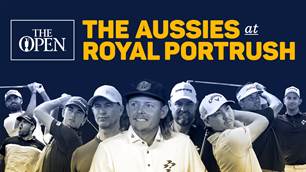
The Aussies at The Open
